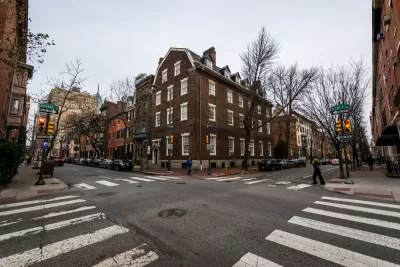The mayor, planning staff, and the Philadelphia Planning Commission agree. The Philadelphia City Council and residents of the wealthy neighborhood of Society Hill, not so much.

"Mayor Jim Kenney has once again vetoed a controversial zoning bill that sought to create a height ceiling in Philadelphia’s affluent Society Hill neighborhood," reports Ryan Briggs.
Planetizen picked up the news in September of legislation that the City Council would downzone the affluent neighborhood over the objections of planning staff and the Philadelphia Planning Commission. The legislation "would have limited development in the area to just 65 feet, or about six stories," according to Briggs.
To supplement the public information about the mayor's veto, Briggs has also obtained a letter from Mayor Kenney to the Society Hill Civic Association, which pushed for the zoning changes—in the letter, the mayor expresses support for a supply side approach to housing policy.
“Restricting overall development in Society Hill, the overlay will limit the supply of units necessary to meet housing demand,” Kenney said. “This will likely place undue pressure on surrounding communities to meet that demand, in turn driving housing prices higher and potentially displacing low-, moderate- and middle-income residents.”
In a previous article, Pat Loeb described the legislation thusly:
The bill would limit building height in the neighborhood, which runs from the Delaware River to 8th Street, between Walnut and Lombard. In some parts of it, buildings could not exceed 45 feet, limiting how much housing could be built there, decreasing the chances for creating mixed income units.
It also increases the number of parking spaces required for new development despite the city's goal of reducing private car use to relieve congestion, improve safety and fight climate change.
FULL STORY: Mayor Kenney vetoes Society Hill height limit

Planetizen Federal Action Tracker
A weekly monitor of how Trump’s orders and actions are impacting planners and planning in America.

The Simple Legislative Tool Transforming Vacant Downtowns
In California, Michigan and Georgia, an easy win is bringing dollars — and delight — back to city centers.

San Francisco's School District Spent $105M To Build Affordable Housing for Teachers — And That's Just the Beginning
SFUSD joins a growing list of school districts using their land holdings to address housing affordability challenges faced by their own employees.

In More Metros Than You’d Think, Suburbs are Now More Expensive Than the City
If you're moving to the burbs to save on square footage, data shows you should think again.

The States Losing Rural Delivery Rooms at an Alarming Pace
In some states, as few as 9% of rural hospitals still deliver babies. As a result, rising pre-term births, no adequate pre-term care and "harrowing" close calls are a growing reality.

The Small South Asian Republic Going all in on EVs
Thanks to one simple policy change less than five years ago, 65% of new cars in this Himalayan country are now electric.
Urban Design for Planners 1: Software Tools
This six-course series explores essential urban design concepts using open source software and equips planners with the tools they need to participate fully in the urban design process.
Planning for Universal Design
Learn the tools for implementing Universal Design in planning regulations.
Smith Gee Studio
City of Charlotte
City of Camden Redevelopment Agency
City of Astoria
Transportation Research & Education Center (TREC) at Portland State University
US High Speed Rail Association
City of Camden Redevelopment Agency
Municipality of Princeton (NJ)



























